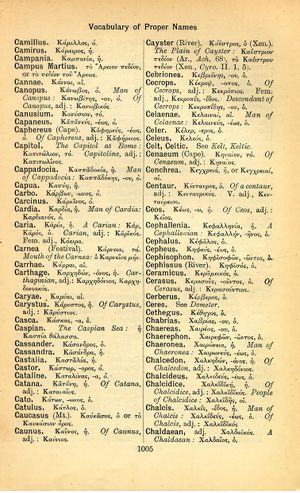Canusium
προγράψαντες οὖν τά τε θεωρήματα καὶ τὰ ἐπιτάγματα τὰ χρεῖαν ἔχοντα εἰς τὰς ἀποδείξιας αὐτῶν μετὰ ταῦτα γραψοῦμές τοι τὰ προκείμενα → having therefore written at the beginning the theorems and the postulates that are necessary for their proofs, we will then write out for you the propositions
English > Greek (Woodhouse)
Κανύσιον, τό.
Latin > English (Lewis & Short)
Cănŭsĭum: ii, n. (Cănŭsĭa, ae, f., Inscr. Murat. 1037, 3),
I a very ancient town in Apulia, now Canosa, founded by the Greeks, and celebrated for its excellent wool, Cic. Att. 8, 11, D, § 1; Liv. 22, 50, 4; 22, 52, 4; Mel. 2, 4, 7; Plin. 3, 11, 16, § 104; 8, 48, 73, § 190 sq.; Hor. S. 1, 5, 91; 2, 3, 168.—
II Derivv.
A Cănŭsīnus, a, um, adj., of Canusium, Canusian: ager, Varr. R. R. 1, 8, 2: rufae, Mart. 14, 129: birri, Vop. Carin. 20. —
2 Subst.
(a) Cănŭsīnus, i, m., an inhabitant of Canusium: bilinguis, i. e. speaking Greek and Latin, Hor. S. 1, 10, 30. —
(b) Cănŭsīna, ae, f. (sc. vestis), garments made of Canusian wool, Mart. 14, 127.—
B Cănŭsīnātus, a, um, adj., clothed in Canusian wool: muliones, Suet. Ner. 30: Syrus, Mart. 9, 23, 9.
Latin > French (Gaffiot 2016)
Cănŭsĭum,¹⁴ ĭī, n., ville d’Apulie, auj. Canosa di Puglia : Cic. Att. 8, 1

